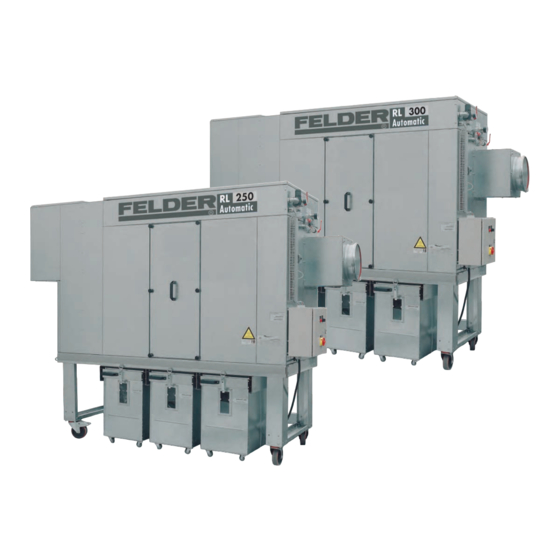
Summarization of Contents
1 General
1.1 Symbol legend
Explains safety symbols used in the manual to highlight important instructions.
1.2 Information about the manual
Describes the manual's purpose, importance, and handling requirements.
1.3 Liability and warranty
Covers manufacturer's liability and warranty terms based on manual instructions.
1.4 Copyright
Details copyright and usage restrictions for the manual's content.
1.5 Warranty notice
Provides information on the warranty period and where to find details.
1.6 Spare parts
Discusses the importance of using genuine spare parts to avoid damage.
1.7 Disposal
Instructions for proper disposal of the machine and materials as hazardous waste.
1.8 Responsibilities of the operator
Outlines operator duties, safety adherence, and reporting requirements.
1.9 Personnel requirements
Specifies requirements for authorized, trained, and qualified personnel.
2 Safety
2.1 Work safety
General safety advice to prevent bodily injury and material damage during operation.
2.2 Manual contents
Emphasizes understanding the manual before operation for safe use.
2.3 Making changes and modifications to the machine
Prohibits unauthorized modifications to ensure optimal performance and safety.
2.4 Intended use
Defines proper use and prohibited applications of the machine.
2.5 Location site requirements
Specifies conditions for the installation site, including space and ventilation.
2.6 Personal protective equipment
Lists essential PPE (clothes, footwear, mask, hearing protection) for safe operation.
2.7 Other risks
Highlights risks like hearing damage and health impairments from airborne particles.
2.8 Machine hazards
Discusses inherent machine risks, particularly electrical hazards.
2.9 Fire hazards
Details risks associated with fire and prevention measures for wood dust.
2.10 Noise emission
Refers to noise measurement standards and workplace values.
2.11 Safety cover
Explains the function and maintenance of the safety cover for protection.
2.12 Procedure in case of fire (Emergencies)
Step-by-step guide for handling fire incidents and emergencies.
2.13 Explosion pressure proofness
Information on the machine's resistance to explosion pressure.
3 Declaration of Conformity
Declaration of Conformity
Details EC conformity, applicable guidelines, and inspection body information.
4 Technical specifications
4.1 Dimensions and weight
Provides physical specifications, dimensions, and weight data for the machine.
4.1.2 Important information
Notes on dust specifications, concentration, and relevant certifications.
4.2 Performance diagram
Visual representation of vacuum and airflow performance curves for different models.
4.3 Data plate
Explains the information found on the machine's data plate.
4.4 Noise emission
Details noise emission measurements and workplace considerations.
5 Transport, packaging and storage
5.1 Safety instructions
Safety guidelines for handling and moving the machine during transport.
5.2 Transport
General advice on transporting the machine, ensuring weatherproofing.
5.3 Transport inspection
Steps to take when inspecting the shipment upon arrival for damage.
5.4 Packaging
Instructions for proper disposal and recycling of packaging materials.
5.5 Storage
Guidelines for storing the machine under optimal conditions to prevent damage.
6 Setup and installation
6.1 Safety instructions
Safety precautions for assembly and installation to prevent injury.
6.1.1 Setup
Requirements for the installation location, including space and ventilation.
6.2 Assembly
General notes and requirements for assembling the machine.
6.2.1 Basic extractor
Instructions for assembling the main extractor unit using lifting procedures.
6.2.2 Chip container (Standardaus equipment)
Assembly of the chip container, base unit, and rollers.
6.2.3 Mirror-inverted operation
How to set up for mirror-inverted operation of the chip container.
6.2.4 Collector casters (Optional equipment: Rotary feeder)
Assembling optional casters for the collector unit.
6.2.5 Vacuum connector assembly
Instructions for assembling the vacuum connector and connection plate.
6.3 Fire prevention and extinguisher
Information on fire prevention and the integrated extinguisher system.
6.3.1 Fire extinguisher: Water
Details on connecting and using the water sprinkler system.
6.3.2 Fire extinguisher: Extinguisher
Instructions for the powder extinguisher system and its servicing.
6.4 Floor space requirement
Specifies clearance needed around the machine for operation and maintenance.
6.5 Electrical connection
Guidelines for connecting the machine electrically, including safety and wiring.
6.5.1 Potential-free contact
How to connect to woodworking machinery or alarm systems via potential-free contacts.
6.5.2 Automatic Starting Device
Describes the automatic starting function for connected machinery.
6.6 Connect the compressed air supply
Instructions for connecting the compressed air supply with pressure requirements.
6.7 Dust extractor operation
General guidelines for operating the dust extractor and connecting hoses.
7 Operation
7.1 Safety instructions
Safety guidelines for operating the machine, including before and during use.
7.2 Inserting/replacing the chip bags
Procedure for safely inserting and replacing chip bags.
7.4 Electrics
Details on electrical controls, modes, and indicators for operation.
7.4.1 Dedusting the filter
Instructions on cleaning the filter system automatically or manually.
7.4.2 Electrics - Optional equipment: Rotary feeder
Operation instructions related to the rotary feeder optional equipment.
7.4.3 Monitoring the dirt accumulation on the filter
How to monitor filter clogging and when to clean.
8 Service
8.1 Safety instructions
Safety precautions to be observed during maintenance work.
8.2 Maintenance schedule
A schedule for routine maintenance tasks based on intervals.
8.3 Motor and electrical equipment
Maintenance tips for the motor and electrical components.
8.4 Dust collector / Seals
Maintenance of the dust collector, focusing on seal tightness.
8.5 Fire extinguisher: Extinguisher / Water
Maintenance and servicing intervals for fire extinguisher systems.
8.6 Extinguisher: Maintenance and servicing (Every two years)
Detailed servicing instructions for the extinguisher every two years.
8.7 Safety cover (Check every six months)
Procedure for checking the safety cover's functionality every six months.
8.8 Empty the condensation receptable
Instructions for safely emptying the condensation receptacle.
8.9 Changing the filter
Steps for replacing filter cartridges when cleaning is no longer effective.
Annex
8.10 Dust hazard prevention
Measures to prevent dust hazards, including proper disposal procedures.
8.10.1 Removing the collected materials
How to safely remove collected dust and shavings from containers.
8.11 Faults, causes and repairs
Troubleshooting guide for common faults and their potential solutions.
9 Annual general revision inspection certificate
Annual general revision inspection certificate
A template for recording annual inspections, detected/eliminated defects, and signatures.







Need help?
Do you have a question about the RL 350 and is the answer not in the manual?
Questions and answers